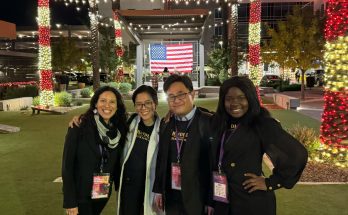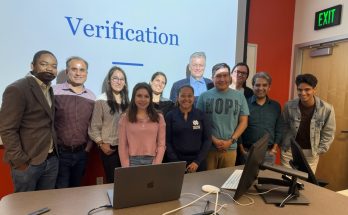<Fatmata narrates her story>
Across Africa, a flow of young minds burns with the
flame of ambition, yearning to transcend their borders and
pursue international education. From Sierra Leone’s
Fatmata Kamara, a brilliant high school graduate who dreams
of studying law abroad to champion social justice, to
Ghana’s Eden Kwesi, an environmental activist aspiring
to tackle climate change at a renowned university, their
stories weave a tapestry of shared hope, ambition, and the
complex realities they face in their quest for scholarships.
Navigating a Maze of Obstacles:
Fatmata’s initial foray into the world of
scholarships wasn’t a walk in the park. With limited
internet access and unclear information, she navigated a
labyrinth of eligibility criteria and application processes,
feeling like she was “wandering in the dark,”
she admits. “There were so many different
scholarships, but it was hard to understand which ones I was
even eligible for, and the application forms seemed
overwhelming.” Eden, meanwhile, faced the daunting
financial burden of studying abroad, coupled with the fierce
competition for coveted scholarship opportunities. “I
knew I had the potential, but the financial costs were
intimidating, and the application process felt so
competitive,” he shares.
Their stories resonate deeply with countless Ghanaian
and Sierra Leonean students who yearn for international
education but face similar hurdles. According to the
International Trade Administration and the US Department
of Commerce, the number of Ghanaian youth seeking higher education is
on the rise, with nearly six million people aged 15-24 in
the country in 2020. Many, like Eden, choose to pursue
degrees in the United States, with data from the
Open Doors Report for 2023
showing that 37 Sierra Leonean students studied there in
that year. However, limited information remains a critical
barrier. Low internet penetration rates and the absence of
dedicated guidance counselors leave many students unaware of
the vast array of available options, creating the perception
that international education is an unattainable dream.
Beyond Individual Struggles: A Systemic Issue:
Veronica Adebayo, a Nigerian woman who persevered to
self-fund her Masters and postgraduate studies, highlights a
deeper concern: the lack of transparency in scholarship
award processes. “Rumors of nepotism and political
influence overshadow merit-based selection,” she
explains, her voice laced with frustration. This resonates
with Mr. Tijjani Mukadda, a respected educator and founder
of the Transition to School Initiative, an NGO working on
inclusive education in Nigeria, who emphasizes the urgent
need for reform in Nigeria’s system to ensure fairness
and opportunity. “The current process is riddled with
systemic issues that disadvantage deserving students,”
he emphasizes. Similar concerns are echoed by Veronica, who
describes the scholarship process as “a demoralizing
maze,” discouraging many from even attempting to
apply.

A Signal of Hope: An Arras of Opportunities:
Despite the challenges, numerous scholarship opportunities
exist, offering a beacon of hope for ambitious young minds.
Programs like the
Mastercard Foundation Scholars Program empower underprivileged students like Fatmata, while
prestigious awards like
Fulbright and
Chevening open doors for diverse academic pursuits, from
undergraduate studies to postgraduate research. However, the
limited information barrier remains a crucial hurdle.
Scholarship organizations and universities must step up
their outreach and marketing efforts, leveraging online
platforms and engaging in community partnerships to bridge
the information gap and ensure equitable access.
Beyond Individual Efforts: A Collective Call to
Action:
The pursuit of international education is often seen as a
path to escape poverty and build a brighter future. However,
the phenomenon of “brain drain” raises concerns
about the impact on sending countries. Addressing this
complex issue requires a collective effort that goes beyond
individual initiatives:
•Raising Awareness: Scholarship
fairs, online platforms, and community outreach programs can
play a crucial role in disseminating information about
scholarship opportunities to students across the continent.
Initiatives like the African Union’s Youth
for
Peace Africa program are already making strides in this
area, organizing workshops
and mentorship programs to
guide students through the scholarship process.
•Equipping Educators: Training school counselors and educators to effectively guide students through the application process can significantly improve their chances of success. Organizations like the Profession.ng Institution can play a vital role in providing such training, equipping educators with the knowledge and resources to support students effectively.
•Financial Aid Programs: Establishing scholarships, grants, and financial aid initiatives specifically targeted towards underprivileged students can level the playing field and create a more inclusive scholarship landscape. Governments, international organizations, and private donors all have a role to play in supporting these efforts. Initiatives like the African Development Bank’s Girls’ in STEM program are already making a difference, providing scholarships and mentorship opportunities to young women pursuing science and technology careers.
•Promoting Digital Inclusion: Expanding internet access and promoting digital literacy
programs can empower students to actively research and apply
for scholarships online, breaking down barriers to
information. Initiatives like the World Bank’s Digital
In summary: Despite facing limited
information, financial burdens, and concerns about
transparency, young Africans are driven by ambition to
pursue international education. Scholarship programs offer a
beacon of hope, but systemic hurdles persist. Increased
awareness through outreach initiatives, educator training,
targeted financial aid, and digital inclusion are crucial
for equitable access. While addressing “brain
drain” concerns is necessary, collaborative efforts
can ensure a brighter future for both individuals and their
communities.
Conclusion: A Journey Worth Taking:
The road to securing an international scholarship is
undoubtedly challenging. Yet, with the right support and
resources, young Africans like Fatmata and Eden can overcome
these obstacles and achieve their academic dreams.
The tapestry created by the dreams of young Africans who desire social justice and international education, such as Fatmata and Eden, shows that the continent has great potential. However, there are obstacles in the way that could damage this, resulting in incomplete and smashed threads.
But this is not a story of defeat. It is a call to action, a clarion call for collaboration to dismantle these hurdles and unlock the full potential of a generation. Let us not simply be bystanders, watching dreams fade due to limited information, financial constraints, or opaque selection processes. Let us become architects, weaving a new narrative where ambition is met with opportunity, and potential is nurtured into reality.
Imagine a future where scholarship information flows
freely, accessible to all through digital platforms and
community outreach programs. Imagine classrooms where
educators, equipped with knowledge and resources, guide
students through the application maze, transforming
confusion into clarity. Imagine a world where financial aid
bridges the gap, ensuring that socioeconomic background does
not dictate access to education.
This future is not a mere dream; it is a concrete
possibility waiting to be realized. Scholarship
organizations and universities must lead the charge,
stepping outside their ivory towers and engaging with
communities, creating a true ecosystem of support.
Governments and international organizations must join hands,
investing in targeted financial aid programs and digital
inclusion initiatives. And let us not forget the educators,
for they are the weavers who thread the dreams of young
minds onto the tapestry of the future. Equipping them with
the necessary knowledge and resources is an investment that
yields exponential returns.




